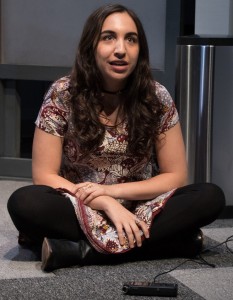Kim Davies’ deftly written new play, Stet, is inspired by the hotly debated 2014 Rolling Stone article, “A Rape on Campus,” which detailed a purported gang rape on the campus of the University of Virginia. The publication later retracted its story amid accusations of poor journalistic practices.
Stet follows journalist Erika Novak (Jocelyn Kuritsky), a journalist assigned to write a story about rape on college campuses. The unsentimental Erika claims to be exhausted—“raped out” is the way she puts it—from a media saturated with similar stories, but her editor, Phil (Bruce McKenzie), challenges her to find a new way to cover the story—cutting to the heart of what really happens to the victims in the aftermath of sexual assault. The playwright herself is no stranger to the heavy topic. As an undergraduate, she attended a college with a pervasive date-rape problem. In 2014 her play Smoke was produced at the Flea Theater and received critical acclaim. Smoke took place at a bondage and fetish party.
In Stet, journalist Erika wades through endless accounts from victims as she tries to find one that stands apart from the typical “rape is bad” story. She discovers Ashley (Lexi Lapp), a college freshman with a horrific story of violent sexual assault by multiple men during her first few weeks on campus. Her accusations, ignored by the school because she didn’t file an official report, implicate a fraternity on campus.
Erika and Phil have found their hit cover story. Erika’s research leads her to Christina Torres (Dea Julien), the project coordinator for Sexual Misconduct Response and Prevention at Ashley’s college. Erika is frustrated by Christina’s confirmation that many cases go unreported to police or campus security, but Christina is adamant that her job is to support the victim in whatever course of action she wishes to pursue. Erika also speaks with Connor (Jack Fellows), the leader of “One in Four,” an activist group on campus. Connor also happens to be vice president of the fraternity Ashley claims is responsible for her rape.
As Erika becomes more invested in the piece, Ashley grows more and more concerned about the implications of speaking out against her attackers. When Ashley says she no longer wants to be a part of the story, Erika talks to Phil about presenting Christina’s personal story instead—a much more “normal” rape story involving drinking and an acquaintance.
Erika, clearly affected by the emotional nature of the piece and her own connection to the topic, must grapple with presenting a story that will turn heads and land her her first cover piece or relating a familiar tale that is often ignored. Kuritsky does a wonderful job portraying Erika’s transformation from unattached, factual journalist to emotionally involved storyteller, helped by Jo Winiarski’s straightforward set, alternating between Erika and Christina’s offices yet morphing easily into a college bar with the help of walls that double as screens. Thanks to Katherine Freer’s projections, the screens add a multimedia element to the production. Scenes from the advocacy event “Take Back the Night” play on the walls as well as text messages between Erika and Ashley.
Multiple red flags throughout her investigation give Erika pause and in the end, she must use her journalistic moral compass to decide what story she shares with the world. Will she forge ahead despite the truth and “let it stand”—literally the meaning of the Latin stet, a common term in editing journalistic copy.
Stet presents audiences with a myriad of moral questions throughout its hour and forty minute run time, which flies by due to the snappy script and smooth staging by director Tony Speciale. The supporting cast of characters really shine as well. As Christina, Dea Julien brings an immediately energetic and likable personality to the stage. There isn’t a line she throws away the entire time she’s performing—brilliantly delivering small talk and moving monologues with the same level of skill.
As Connor, Jack Fellows speaks powerful and thought-provoking dialogue while believably remaining the typical “frat bro.” McKenzie plays Phil with a frustrating lack of self-awareness and detachment.
Davies’ script is full of lines that may sound cruel or politically incorrect when they come out of the actors’ mouths, but what is so powerful is the realization that similar things are said time and time again in the national conversation around sexual assault.
Stet runs through July 3 at the Abingdon Theatre Company (312 West 36th St.) through July 3. Evening performances are at 7 p.m. Tuesday through Thursday and at 8 p.m. Friday and Saturday; matinees are Sundays at 2 p.m., and there is an additional matinee at 3 p.m. June 25. You can order online at http://abingdontheatre.org/stet/ or by calling the box office at 212-868-2055. (A portion of all ticket sales will be donated to Take Back the Night.)








